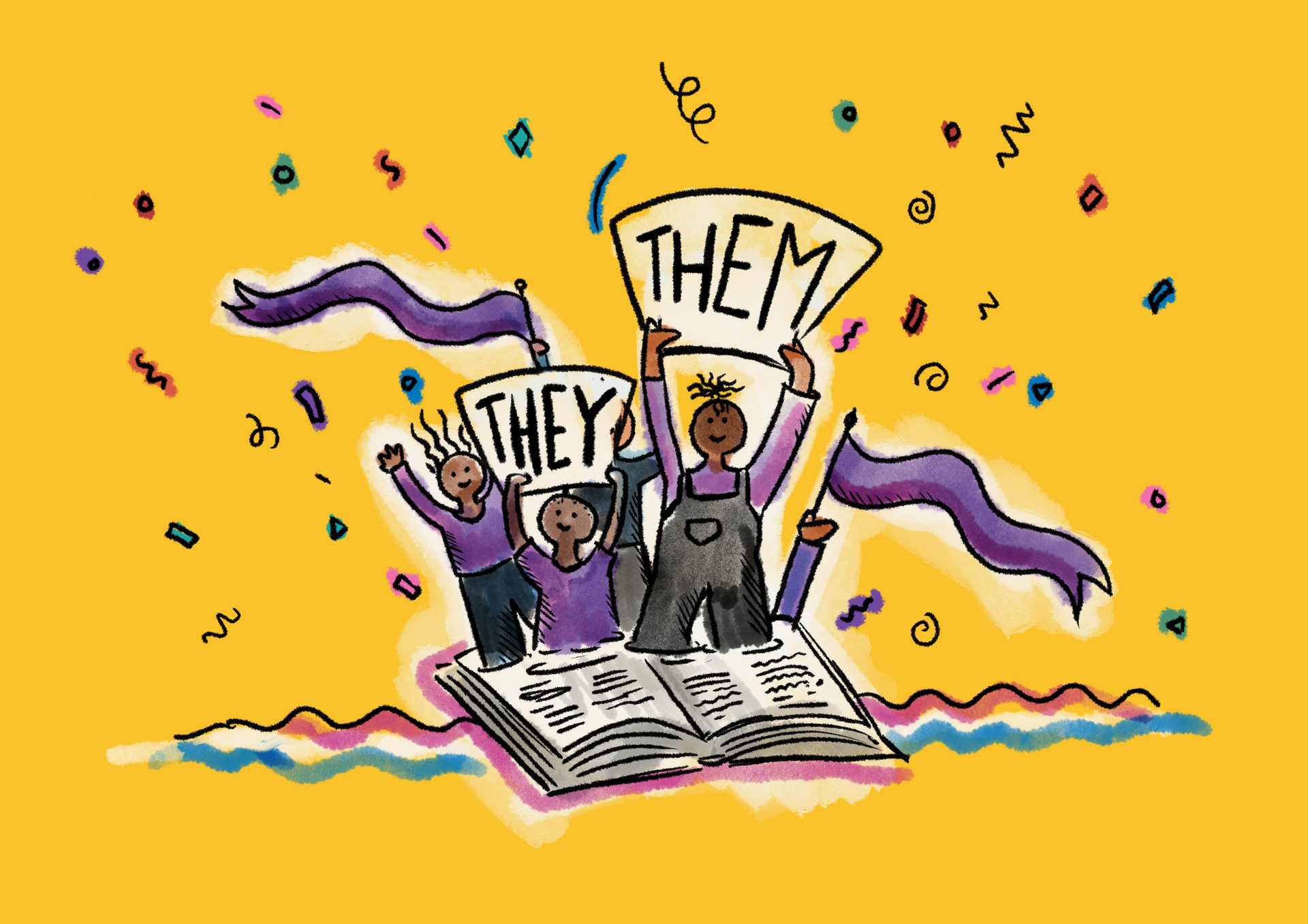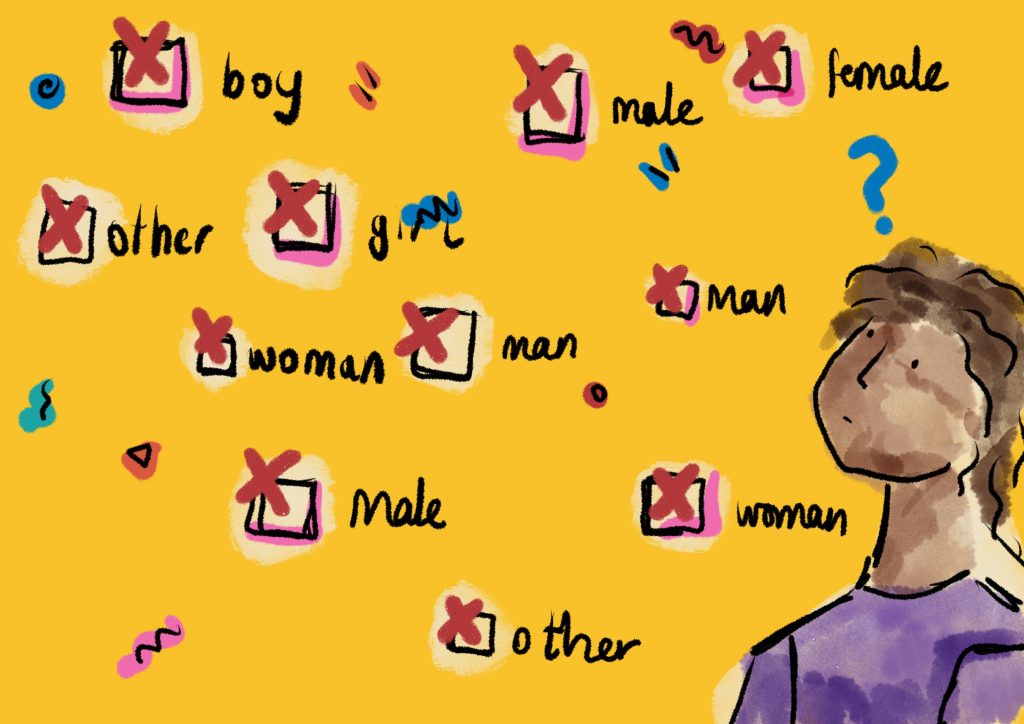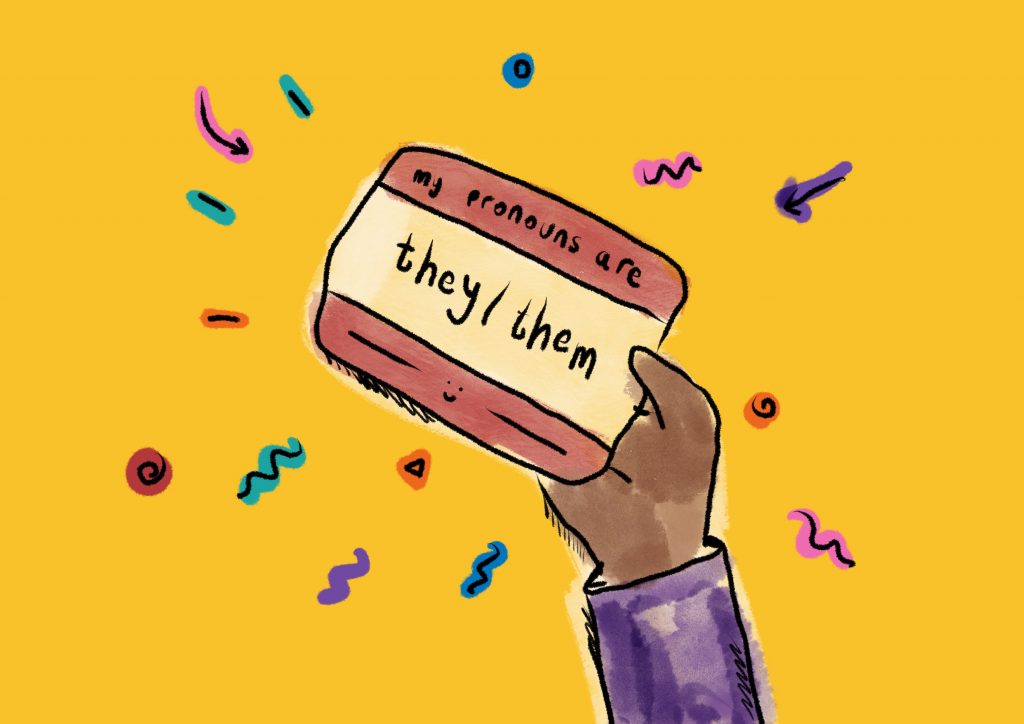
Soofiya
Understanding non-binary pronouns: ‘We have created language that fits our truth’
June Bellebono writes about the history of pronouns and why they are so important
June Bellebono
29 Sep 2019
Illustration by Soofiya
There’s no one way of being, looking or feeling non-binary. It is a personal gender identity that revolves around constantly growing and discovering what joy in your body and identity looks like. For me, right now, it looks like being referred to with they/them pronouns. It also looks like having laser hair removal on my face, even though I cry at every session and I’ve had to increase my overdraft. For me, right now, it looks like wearing a mini skirt, even though someone will shout “YOU HAVE A DICK” at me in Tesco.
Last week, Merriam-Webster added singular non-binary they/them pronouns to their online dictionary. This follows an announcement by Sam Smith of their non-binary identity and their decision to use they/them pronouns from now onwards. This has caused uproar on social media, with people feeling justified in openly expressing their transphobia, as if non-binary identities are up for debate.
There seems to be a widespread idea that being non-binary, and the language around it, is a new phenomenon. However, it’s important to point out non-binary and trans people have been adapting and creating language that better fits their truth throughout history. In 1895, New York self-identified “androgynes” started a club called the Cercle Hermaphroditos, to unite against the world’s bitter persecution of them. Berlin’s Drittes Geschlecht (“Berlin’s Third Sex”) is a book published in 1904 that looked at gender variance in Berlin.
Evidence of the first time the gender-neutral title “Mx” was used date back to 1977, in an attempt to challenge the sexism of opposing gendered titles. The term “genderqueer” can be seen in print for the first time in 1995, as part of the newsletter for Transexual Menace, a transgender rights activist organisation in New York. The belief that all of a sudden millennials and Generation Z started coming up with identities and language is inaccurate and harmful.
It’s also important to remind ourselves we don’t actually need archaic white institutions to recognise us or a high profile celebrity to come out to legitimise the validity of non-binary identities, as they have existed for centuries, and across the world, before “non-binary” was even a term. Two-spirit, Bakla, fa’afafine and Burneesha are some of the many pre-colonial trans identities which challenge binary ideas of gender, and showcase existence outside the strict, fixed categories of “male” or “female”. Even if non-binary identities remain legally unrecognised for the next century, that doesn’t take anything away from us existing in a valid way – it just makes it harder. Unfortunately, people are more likely to listen if a dictionary officially says that singular they is a “thing” (even though we’ve been saying it for time) or if the government officially gives you an “Mx” title.
“The belief that all of a sudden millennials and Generation Z started coming up with identities and language is inaccurate and harmful”
Sam Smith is not the first celebrity to use they/them pronouns. Following actors like Indya Moore and Asia Kate Dillon, it seems like awareness of non-gendered pronouns (and language) is no longer limited to queer and “woke” bubbles, but is extending to the mainstream. On the one hand, this comes as a welcome possibility: more people being aware of non-binary identities, and they/them pronouns, could take away some of the constant educating people who aren’t cis have to do. People might start to learn the nuances of non-binary identity – that some non-binary people may wish to medically transition, some have a presentation that is more aligned with the gender they were assigned at birth, some may want to use gendered pronouns, and that these are all valid expressions of one’s identity. Some would consider themselves trans, whereas some would see non-binary as its own entity, not falling into cis or trans.
Hopefully, greater prevalence of non-gendered pronouns will also make these terms more available to non-binary people who don’t have the resources, connections and language to find out about the possibility of existence outside a binary, and will consequently be able to reflect on themselves with a new understanding and build new connections out of this. It’s essential to recognise race, class, legal status, housing and several other factors all come into place in someone being safe enough to live as authentically as they’d like to. However, with more visibility, comes more abuse. The more (basic) rights the trans community receives, the more upset cisgender people seem to get.
Since coming out, the backlash Sam Smith has received has been both incredibly sad and unsurprising, with thousands of people shouting about their outrage and anger towards their decision. The arguments being used to delegitimise Sam’s pronouns and non-binary identity are all the same. They are arguments that trans people have heard over and over and over again: our identities are made up and attention-seeking, we should “pick a side”, the only thing that matters is our “biological sex”, the language we’re using is wrong, etc.
“The arguments being used to delegitimise Sam Smith’s pronouns are all the same – arguments that trans people have heard over and over and over again”
All of these statements have time and time again been debunked from a social, political, grammatical, psychological and scientific point of view, and clearly come from a place of both ignorance and hatred – but the thing that I still find puzzling is the amount of energy and outrage cisgender people dedicate to something that, in practice, has zero effect on their daily lives. Referring to someone as a “person” instead of as a man or a woman, or using they/them pronouns instead of “he” or “she” is, when you think about it, both something that requires a very small amount of commitment but also something that we actually already do in English!
Here is an example of a standard conversation I’m pretty sure most of us have experienced at some point in our lives: “Hey xxx, there’s someone on the phone for you.” “Oh – who are they? what do they want?”. In a way, using this comes as a rejection of men-centred gendered language – the historical alternative to this would have been “what does he want?”. They here refers to a singular person, not multiple, and this is language which is now commonly used when referring to someone whose gender is both unknown and irrelevant. From a grammatical point of view, there is actively no difference between doing this with this purpose, or doing it for someone who’s made the choice to use they/them pronouns.

This clearly shows that this outrage with regard to the English language evolving, and this (sudden) obsession with grammar, is nothing more than blatant transphobia, and an attempt to invalidate people’s truths. I see the same people who use relatively new words such as “tweet” refuse to use singular “they” as they don’t want the English language to change, despite it being in constant mutation in several other spheres.
This disdain people are expressing toward the so-called violation of the English language also cannot be separated from white supremacy and eurocentrism, as genderless languages can be seen across the world. Farsi, Bengali, Yoruba and Tagalog are just some of the many languages where pronouns are not gendered. It’s actually important to point out that more recently in Tagalog it has become more common to add -a or -o as a suffix to denote gender, but this seems to be due to Spanish/Castilian colonial influence. This is an example of how white colonialism promoting a strict gender binary can permeate language in the Global South.
Similarly, the popularity of the term “ladyboy”, in reference to transfeminine people in Thailand, is inextricable from the white gaze. It’s a discriminatory and dehumanising word, and actually wrongfully translated. Kathoey, the Thai term, can actually also refer to gay men and gender-variant assigned male at birth individuals. When googling kathoey, I was disgusted by the majority of the results being articles about how to spot “ladyboys”, or men sharing their fetish experiences. An inaccurate, offensive and harmful translation is now part of people’s dictionaries, and even used by Thai people themselves for ease of understanding.
All of this information acts as proof of the level of hypocrisy and inaccuracy cisgender transphobes will cling to in an attempt to justify their transphobia. This obsession over biology, grammar and tradition is something that is only pressing when the liberation and acceptance of a marginalised group is at stake. There is an idea that trans acceptance and liberation equals oppression for cisgender people. This is a completely made up ideology, with no solid logic to back it up. I’m a strong believer that trans liberation and the challenging of strict gender notions allows for collective liberation across society.
“Genderless languages can be seen across the world. Farsi, Bengali, Yoruba and Tagalog are just some of the many languages where pronouns are not gendered”
From a linguistic point of view, what I’ve noticed since adopting gender-neutral pronouns and personal terms, and surrounding myself with individuals who do the same, has been how the obsession on people’s genders tends to be, a lot of the time, irrelevant. I have full-on conversations about people who use they/them pronouns without the other person ever knowing what the person’s assigned gender at birth was – as it would have had absolutely no impact on the information I was sharing. This way, no (un)conscious biases and prejudices were triggered by that unnecessary information.
Living in a heavily gendered society seems to be inextricably linked to violence. TERFs (trans-exclusionary radical feminists) are creating a dangerous environment not only for trans women and gender non conforming people, but also for women, like Caster Semenya, who don’t fit their idea of womanhood. Men are constantly showing cruelty towards femininity, whatever shape or form that might take. The gender binary is not only violent, but also embedded in white supremacy, and the rejection of it would lead to a greater degree of freedom – even for cisgender folks.
Even though I’m speaking confidently about this, and actively condemning these transphobic statements, I would be lying if reading this rhetoric and seeing the level of support it receives, hasn’t made me question my own beliefs and identity. It was interesting reading Sam Smith’s statement, an artist who admittedly I’ve cared very little for in the past, and finding myself relating to them when they speak about being nervous about what people think or feeling like they don’t have the knowledge or eloquence to speak about being non-binary. Being non-binary should not be an academic concept we need to research in order to understand ourselves better, or to have the appropriate and acceptable (aka white/middle class) language to communicate who we are accurately. However, it’s hard not to feel like we need to be able to uphold this identity confidently when it’s constantly shut down, and framed as attention-seeking.
“There seems to be this idea that with trans acceptance and liberation comes oppression for cisgender folks”
The idea of my pronouns and identity being a burden is, sadly, very embedded. I get misgendered pretty much on a daily basis – from strangers, colleagues and loved ones, and I’m ashamed of the incredibly low amount of times I will actually correct someone. I feel very strongly about my beliefs and my transness but it’s hard not to feel like an inconvenience when society paints you out to be one, when society is not kind to you, when it’s clear society would prefer if you were one, or the other.
I am not ready to be vocal and visible about my transness in every sphere of my life, but that doesn’t make my transness any less valid. Me not batting an eye when someone calls me a “he”, or a “man”, or a “sir”, does not mean I’m okay with that – my heart drops and the realisation that I can’t escape manhood regardless of how hard I try takes over me every time it happens, and yet I stay silent, smile and carry on with my day. The fact I know how easy it is to use gender-neutral pronouns and language (I had to learn this too!), and how important it is for this to be respected, doesn’t make it any less exhausting to either have a two minute argument legitimising this, or hearing a two minute apology about how sorry, but actually woke, the other person is.

There seems to be a constant emphasis and unnecessary attention on people’s transness, which can single us out and create discomfort. The attention is usually negative and offensive – I see tweets that say “If you have a dick, you are a man!!! I will only refer to you as he!!!” getting 100k retweets every day. Sometimes discomfort still arises when intentions are not necessarily negative. I have taken part in events where I was encouraged to write down my pronouns on a sticker, or share my pronouns in a circle, and when deciding to opt-out, have received funny and disappointed looks. My transness is mine and it’s my decision when and how to share it – and again, this doesn’t delegitimise my identity. It’s important for people to be seen how they want to be seen. If I don’t want to be referred to as a man, but also don’t want to draw attention to my transness, I want that to be respected. If someone is a passing binary trans person and does not want to share their pronouns, respect that, because the act of stating something they might not want to be questioned, comes with a lot of dysphoria.
Seeing cisgender, and straight, people talk about non-binary identities and they/them pronouns openly and publicly, when for a long time this has been a societally marginal concept, holds equal amounts of promise and dread. I would like us to utopically move to a place where no one’s gender is assumed, where they/them pronouns are universally accepted and normalised, and where people feel free to be free when it comes to gender identity and expression. However, looking at the degrees of transphobia our current society holds, as well as the incredibly strict gendered reality we live in, I do not see this as a move we should advocate for yet. The idea that referring to everyone with gender-neutral pronouns will automatically promote a less violently gendered society is not something which seems realistic; my experience as a non-binary person assigned male at birth will still be drastically different from the experience of a non-binary person assigned female at birth, and for both of us to be truly liberated, these differences need to be acknowledged and considered.
“Seeing cisgender people talk about non binary-identities and they/them pronouns holds equal amounts of promise and dread”
More knowledge, more understanding, more acceptance, and more willingness to (perpetually) grow are what’s needed for trans rights and the language which accompanies them. Cases like Sam Smith and Travis Alabanza being misgendered in the national press are unacceptable. In both cases, the articles were specifically talking about the artists’ gender and decision to use they/them pronouns and seemed to deliberately make a point to not use the right pronouns. This is part of a bigger climate of transphobia in the British media. Outlets which do not hold a transphobic agenda must be willing to listen to trans people’s wants and needs, from politics to language, and respect that.
It’s sad that our identities are only beginning to be seen as genuine now that they’re more visible in the (white) mainstream media – when black and brown people have been challenging and living outside the binary for so long. However, time and time again we’ve seen (cisgender straight white) people be more open to listening and accepting things when they’re made more palatable via their white, conventionally attractive, middle-class counterparts. I don’t think Sam Smith’s non-binary experience shares many similarities with mine, but my hearts still hurts in seeing them being harassed online. I wish for a future where all trans people are seen, treated with kindness and celebrated – the fact this seems like an unachievable fantasy terrifies me.








